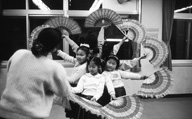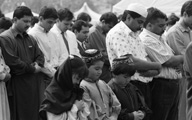Foreign Residents of Tokyo
Kitamura Minao and Hiro Riko, who are active in the Japanese Ethnological Film Society, portray foreign residents of Tokyo through the lens of visual ethnology.
Koreatown: Chejudo Koreans in Tokyo
(“Nippori-Mikawashima monogatari: Kankoku Saishuto kara no hitobito”)- JAPAN / 1996 / Japanese / Color / Video / 36 min
Director: Kitamura Minao
Photography: Yanase Yuji, Kitamura Minao
Editing: Matsuda Yoshiko
Sound Editor: Hashimoto Miyuki
Narrator: Akaza Miyoko
Academic Cooperation: Ono Yuji
Producer: Miura Yoko
Production Company, Source: Visual Folklore
 The Arakawa Ward of Tokyo, around Nippori and Mikawashima stations, has a long history of migration and a large population of South and North Korean immigrants in residence. In addition to newcomers, there are first, second, third and fourth-generation Koreans who immigrated after Japan annexed Korea in 1910, and during World War II. Of all these Koreans, the number of those from Koneri village on Jeju Island is the largest, and the population of Koneri villagers living in Tokyo has now overtaken that of Koneri village itself. When and why did they immigrate? What do they think it means to be Japanese? What does it mean to be a Korean in Japan? This documentary seeks to explain the lifestyle, way of thinking and identity of the Jeju Koreans living in Tokyo.
The Arakawa Ward of Tokyo, around Nippori and Mikawashima stations, has a long history of migration and a large population of South and North Korean immigrants in residence. In addition to newcomers, there are first, second, third and fourth-generation Koreans who immigrated after Japan annexed Korea in 1910, and during World War II. Of all these Koreans, the number of those from Koneri village on Jeju Island is the largest, and the population of Koneri villagers living in Tokyo has now overtaken that of Koneri village itself. When and why did they immigrate? What do they think it means to be Japanese? What does it mean to be a Korean in Japan? This documentary seeks to explain the lifestyle, way of thinking and identity of the Jeju Koreans living in Tokyo.
Muslims of Tokyo: The Lives and Prayers of Pakistanis in Japan
(“Musurimu: Zainichi Pakisutanjin no inori to seikatsu”) JAPAN / 1995 / Japanese / Color / Video / 36 min
JAPAN / 1995 / Japanese / Color / Video / 36 min
Director: Hiro Riko
Photography: Takahashi Shinji
Editing: Matsuda Yoshiko
Sound Editor: Hashimoto Miyuki
Visual Effects: Tadaka Shingo, Toyama Satoshi
Narrator: Akaza Miyoko
Producers: Goto Masaharu, Kitamura Minao
Production Company, Source: Visual Folklore
This film sheds light on the relatively unknown lives of Muslims living in Tokyo. A mother sends her children to a Japanese public school; every morning she prepares lunches for them using halal food to make the same menu as the school lunch. The children’s father values worship more than school, and takes his children to religious services in central Tokyo. One Pakistani youth lives illegally in Japan—why does he continue to work in Tokyo? At the bottom of the heap, the Pakistani boy gives voice to the contradictions of Japanese society. What decision does he finally make? This documentary reveals one side of multinational Tokyo.
